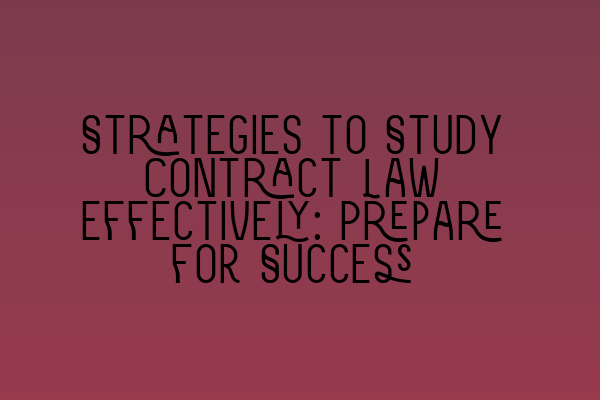Strategies to Study Contract Law Effectively: Prepare for Success
Studying contract law can be a challenging endeavor, but with the right strategies and preparation, you can set yourself up for success. Whether you’re a law student, aspiring solicitor, or legal professional looking to enhance your knowledge, these tips will help you effectively study contract law and excel in your endeavors.
1. Understand the Basics
Before diving into the complexities of contract law, it’s crucial to establish a solid foundation of the basics. Familiarize yourself with essential terms, concepts, and principles such as offer, acceptance, consideration, intention to create legal relations, and capacity. By understanding the fundamentals, you’ll be better equipped to analyze and apply contract law principles.
2. Break it Down
Contract law can seem overwhelming due to its extensive nature. To alleviate this feeling, break down the subject into manageable chunks. Focus on individual topics or cases and study them one at a time. This approach allows for a more in-depth understanding and enables you to see how the pieces fit together in the larger framework of contract law.
3. Create Summaries and Flowcharts
Visual aids can be immensely helpful in grasping complex legal concepts. Create summaries and flowcharts for each topic or case you study. These visual representations will serve as useful reference tools and help cement your understanding. Additionally, they can serve as quick revision aids when preparing for exams or legal practice.
4. Engage with Real-Life Case Studies
To truly appreciate the intricacies of contract law, it’s vital to engage with real-life case studies. Reading legal textbooks and studying theoretical scenarios is crucial; however, it’s equally important to understand how contract law principles are applied in practice. The related article on Unveiling Real-Life Case Studies: Insights into Legal Practice and Decision-Making provides valuable insights and examples that can enhance your understanding and give you a practical perspective.
5. Test Yourself with Practice Questions
Regularly testing your knowledge and understanding is essential to gauge your progress and identify areas that need improvement. Practice contract law questions and scenarios to simulate real-life situations. Analyzing and answering these questions will sharpen your analytical skills and familiarize you with applying contract law principles to different scenarios.
6. Seek Guidance from Experienced Legal Professionals
Don’t be afraid to reach out to experienced legal professionals, such as solicitors or contract law tutors. They can provide guidance, answer your questions, and offer valuable insights gained from their practical experience. Their perspectives can supplement your studies and give you a deeper understanding of how contract law works in the real world.
7. Stay Up-to-Date and Embrace Technological Advancements
Contract law is a dynamic field, and staying up-to-date with the latest developments is crucial. Follow legal blogs, read industry publications, and engage with online communities to keep yourself informed about significant contract law cases, changes in legislation, and emerging trends. The related article on Embracing the Rise of Virtual Law Practices explores how technology is reshaping the legal industry and can provide useful insights into the intersection of contract law and technology.
Conclusion
Studying contract law effectively requires a combination of understanding the basics, breaking down complex topics, creating visual aids, engaging with real-life case studies, testing yourself with practice questions, seeking guidance from professionals, and staying up-to-date with the latest legal developments. By implementing these strategies, you’ll be well-prepared and poised for success in your contract law studies and future legal practice.
For more information on pursuing a legal career, you may find the related articles below helpful:
- Barrister vs. Solicitor: A Comprehensive Comparison
- Exploring Different Solicitor Specializations: Finding Your Niche
- Embracing the Rise of Virtual Law Practices
- Navigating the Maze: Demystifying Ethical Responsibilities of Solicitors
- Unveiling Real-Life Case Studies: Insights into Legal Practice and Decision-Making
